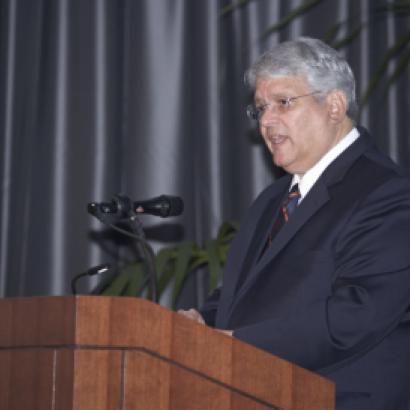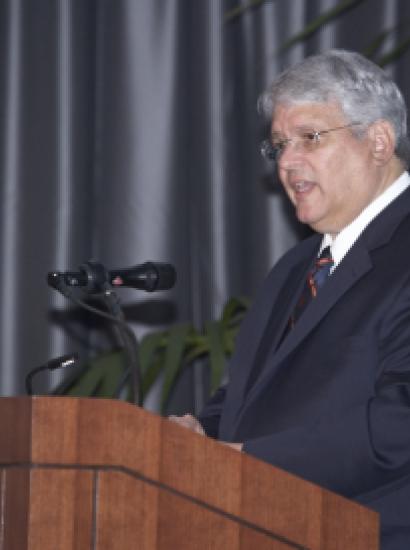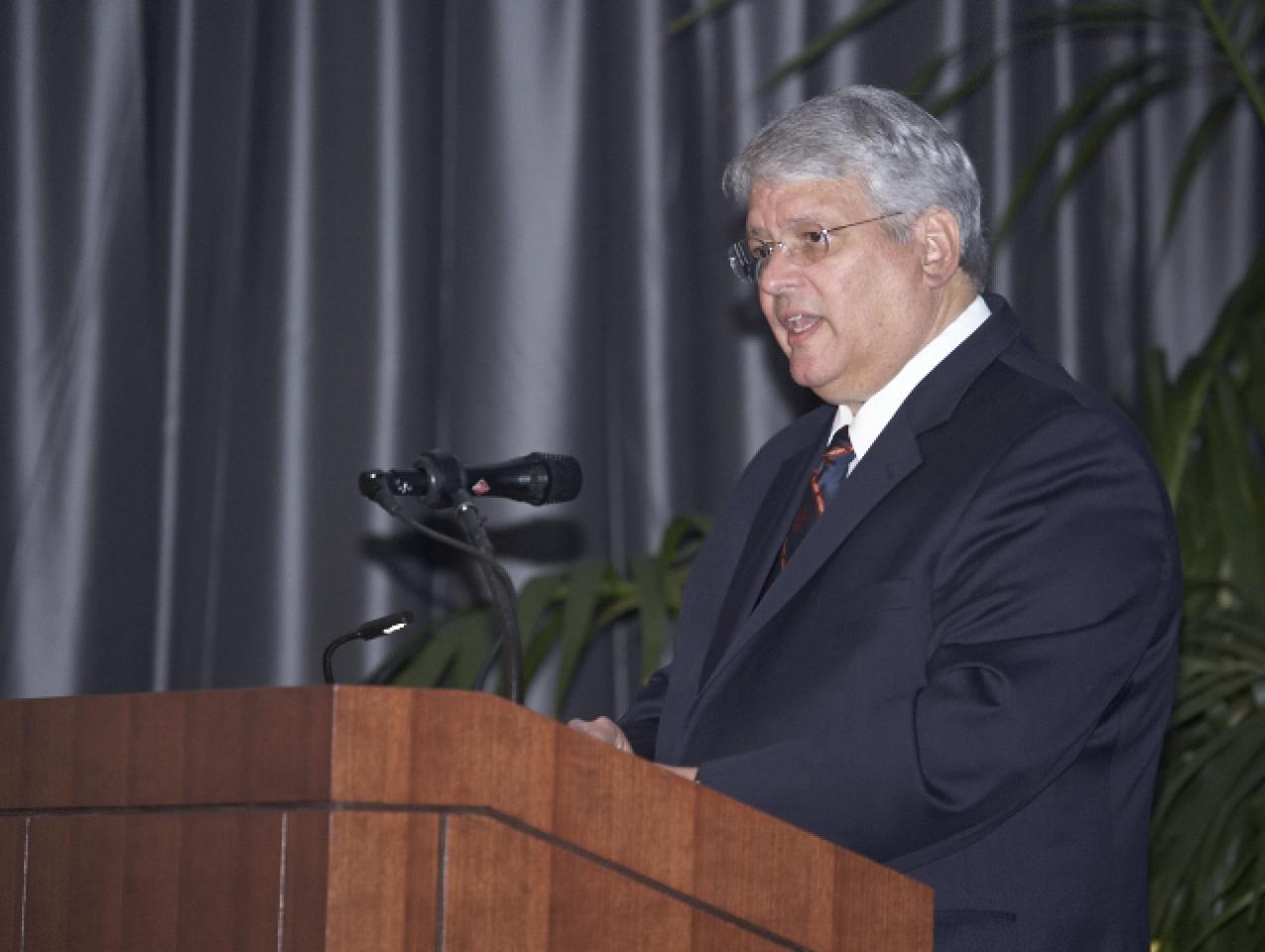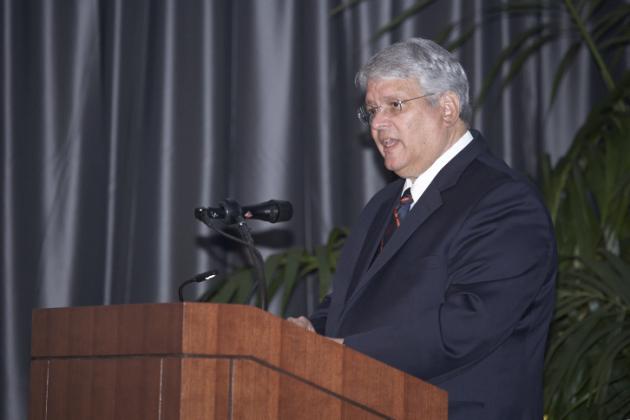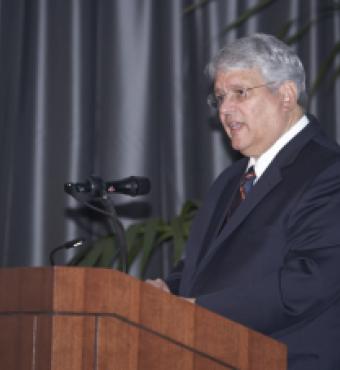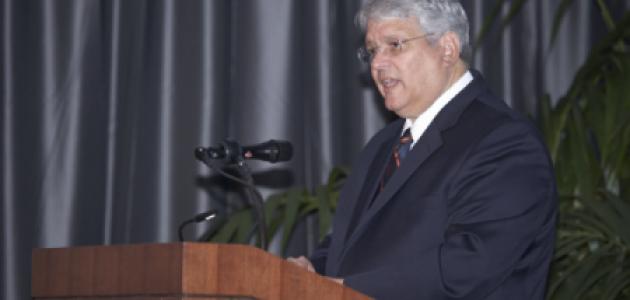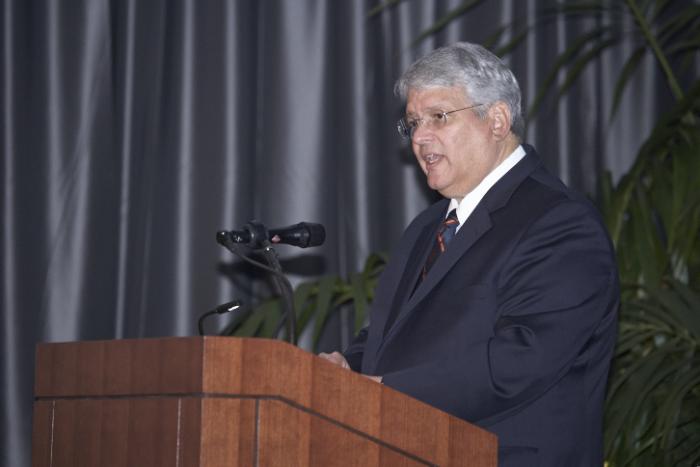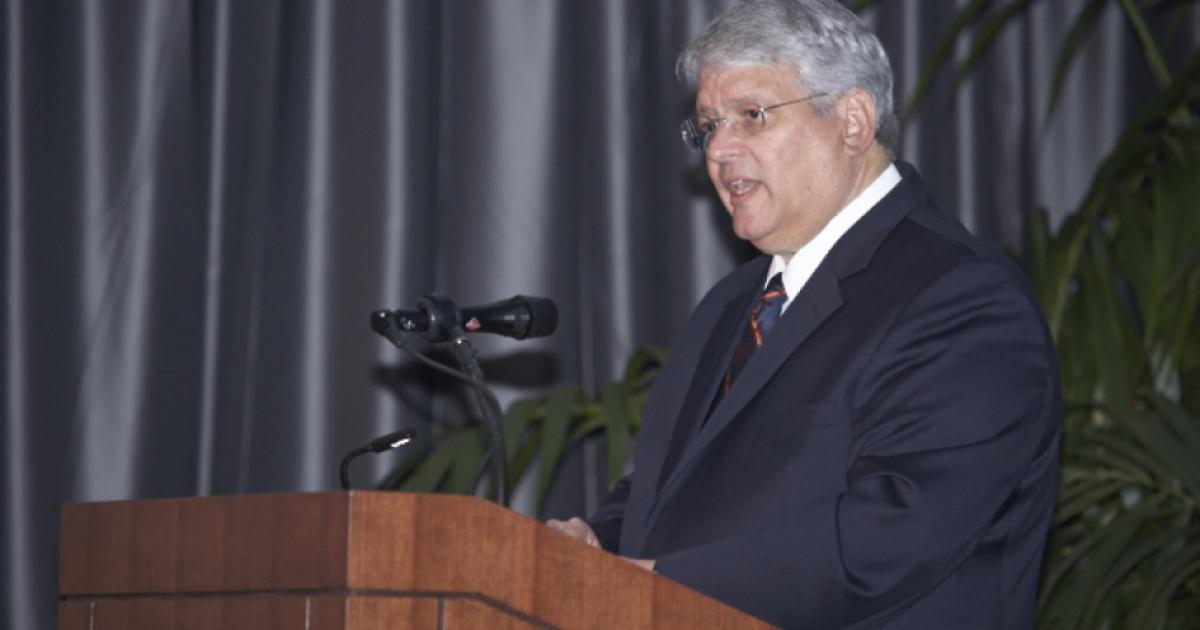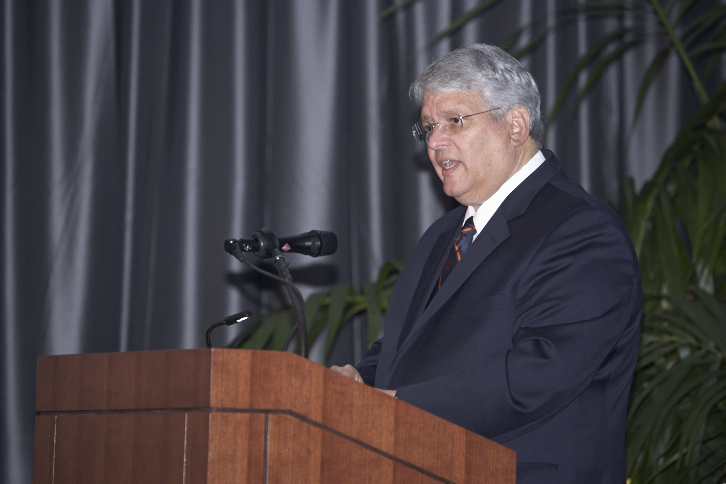
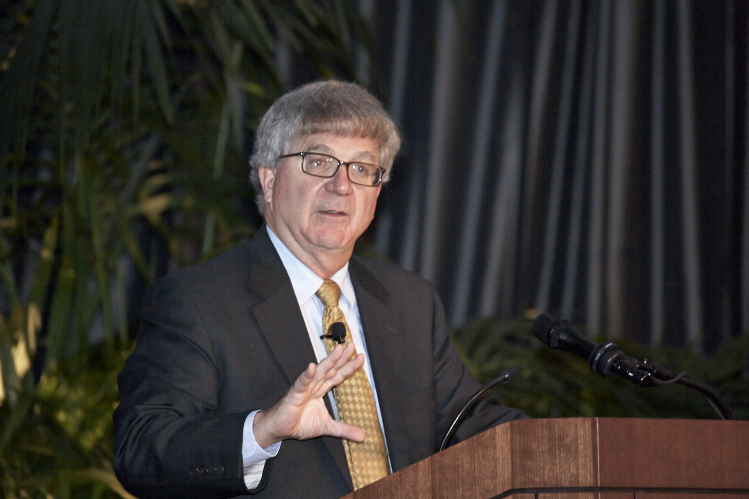
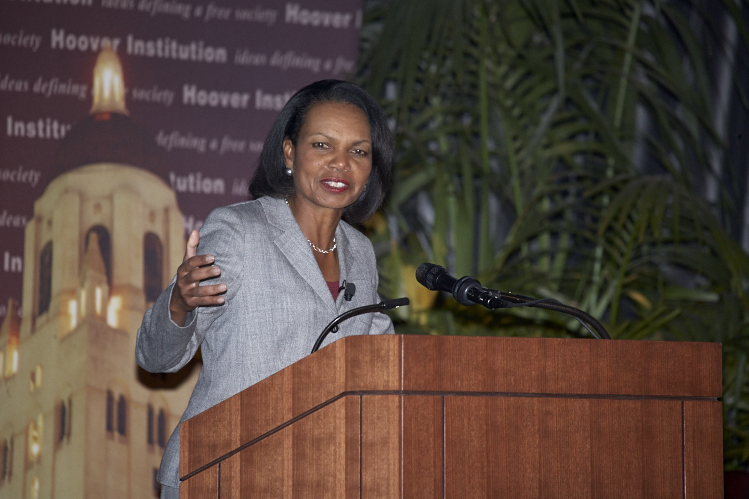
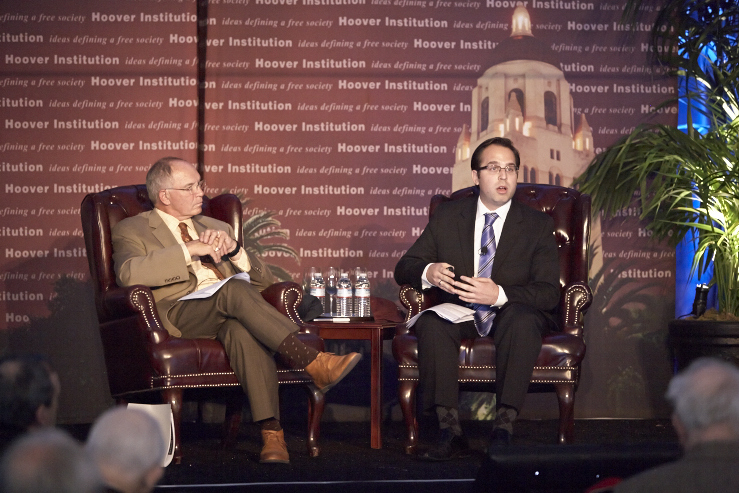
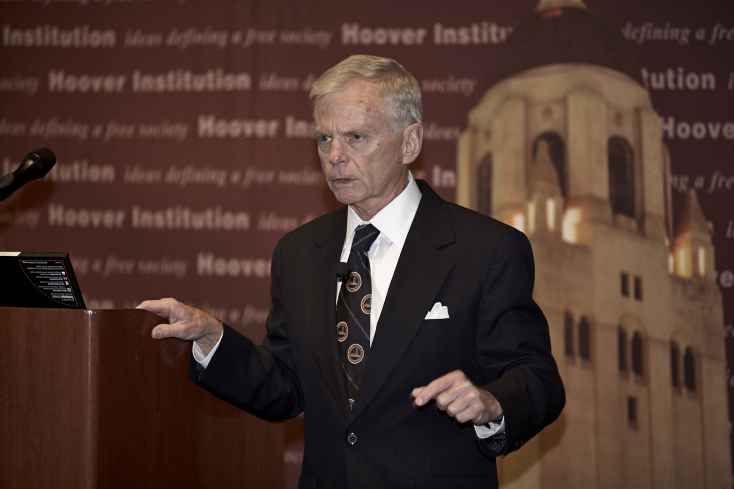
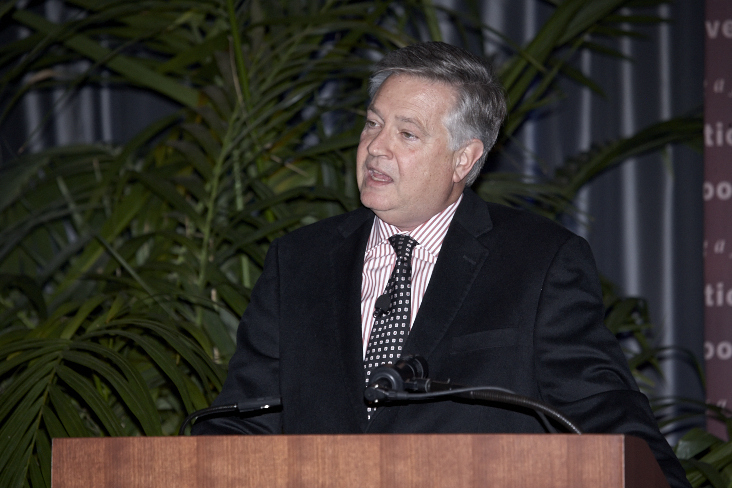
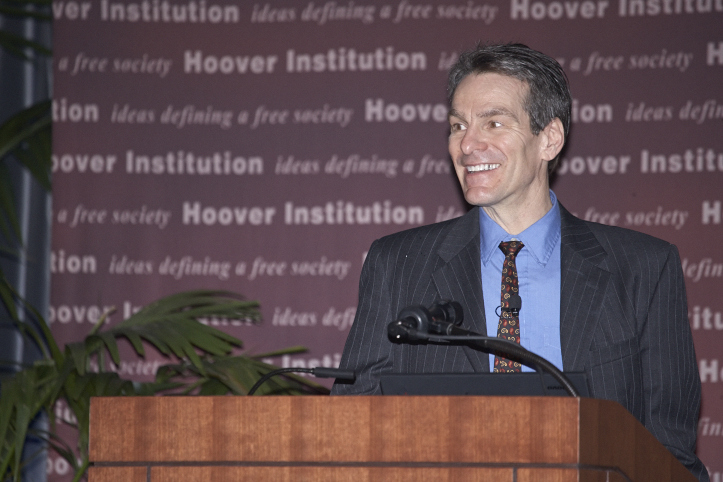
The Hoover Institution hosted its annual Fall Retreat beginning on Sunday, October 27, 2013. Below are summaries of all the presentations from the three-day event, accompanied by links to the audio or video files when available.
Browse by scrolling through this page, or jump directly to the specific speaker here:
Fouad Ajami; Terry Anderson and Carson Bruno; John Cochrane; David Davenport; Victor Davis Hanson; Michael Hayden; Thomas Henriksen; Michael W. McConnell; Abbas Milani; Kevin Murphy; Condoleezza Rice; Russell Roberts; Kori Schake; William Shawcross; John B. Taylor; and Eric Wakin
Sunday, October 27, 2013
Michael Hayden
General Michael Hayden, a retired US Air Force four-star general, former director of the National Security Agency (1999-2005), and former director of the Central Intelligence Agency (2006-9), gave a candid perspective on his views of the world. His talk entitled “Hot Spots at Home and around the World” emphasized the changing nature of the international system and revolved around his top six worrisome issues in the world: Iran and nuclear weapons; the potentially catastrophic consequences of the Chinese state failing; the weakness of the Mexican state; the rise of the cyber domain; Syria and the Arab awakening; and terrorism. He noted that many of his points are not based on nation-states or state power, as was the case for the past several decades, and that we are currently in the process of retooling our institutions to combat threats emerging from non-state entities.
Monday, October 28, 2013
Russell Roberts: “the world of education is changing for the better”
Russell Roberts, the John and Jean de Nault Research Fellow at the Hoover Institution, discussed the state of education in the United States in his talk entitled “The Education Revolution.” He highlighted podcasts and Massive Open Online Courses (MOOCs) as promising avenues for the Internet to reform education. He referred to his work in using technology as an education tool, such as EconTalk, his rap videos, and The Numbers Game.
Michael W. McConnell: “when the Court gets its hands on a hot-button cultural issue case, it is a different court”
Michael McConnell, a senior fellow at the Hoover Institution, discussed last year’s Supreme Court term in his talk entitled “Sex, Marriage, Race . . . and a Little Law: The Supreme Court’s Latest Term.” His talk focused on two cases: Shelby v. Holder and United States v. Windsor. His critiques revolved around the precision and the application of the Constitution.
Victor Davis Hanson: “we can’t take a break from foreign policy even if we want to take a break”
Victor Davis Hanson, the Martin and Illie Anderson Senior Fellow at the Hoover Institution, discussed the incoherence of recent US foreign policy in his talk entitled “American Foreign Policy as Paradox.” Hanson outlined his views of foreign affairs around the world, including the influence of the United States in the South China Sea vis-à-vis nuclear weapons; America’s tense relationship with Germany and the United Kingdom; and receding US power throughout the Middle East, despite historical bipartisan agreements.
John B. Taylor: “when the Fed is more predictable, steadier, a limited purpose institution, things work better”
John B. Taylor, the George P. Schultz Senior Fellow at the Hoover Institution, discussed what we have learned from the Federal Reserve in the past century in his talk entitled “After 100 Years, What’s Next For the Fed?” He focused on variation in economic performance, changes in de facto independence (noting that there is not much change in de jure independence), and rules-based versus discretionary policies.
Condoleezza Rice: “we are seeing significant problems of governance across the world”
Condoleezza Rice, the Thomas and Barbara Stephenson Senior Fellow at the Hoover Institution, discussed problems of governance around the world. Her tour of the world began with the lack of fiscal coordination across the different European countries. She argued that “a budget is a reflection of the government’s obligations to its people” and that different governments have made different promises to their people. Rice continues on to Russia, focusing on its heavy reliance on oil, gas, and minerals, compounded by the Kremlin’s close relationship with the resource cartels, which has resulted in alienating the best and brightest minds of young Russian citizens. Next Rice discussed Turkey, focusing on its struggle to balance secularism and Islam in terms of human rights. Rice proceeded to Brazil, focusing on its overextension of promises in the wake of riots earlier this year, and to India, focusing on corruption in South East Asia’s largest democracy. Rice advanced to neighboring China, listing the rise of riots due to the lack of rule of law, its one-child policy, the Internet, environmental degradation, and product safety. She argued that, thus far, China’s legitimacy has been based on prosperity; to address its governance problems, China must deliver legitimacy based on consent–a terrifying challenge to the Politburo. Finally, Rice discussed the United States, highlighting that the governance issues of the US become the governance issues of the world. She cited the collision between the twenty-four-hour news cycle and the way the Founding Fathers intended politics to operate, the polarization of information distribution, and the phenomenon of “dressing up” policy differences and matters of principle as some causes of the US governance problem. Rice proceeded to outline some tools the United States could call on to address its governance problem: the Canada-US energy platform; the federal system and the state as a “laboratory for innovation and change”; the vibrant private economy; voluntary associations; and a strong respect for rights. She concluded with a reflection on American values.
Terry Anderson and Carson Bruno: “we should fete over fracking partly because it has given us a huge supply of natural gas”
Terry Anderson, the John and Jean de Nault Senior Fellow at the Hoover Institution, and Carson Bruno, a research fellow at the Hoover Institution, discussed developments in the energy industry in their talk entitled “Fracking: Should You Fret or Fete?” Bruno outlined the technological advancements that make fracking profitable today, and Anderson discusses how fracking could benefit the US economy and political arena. The second part of the talk focused on the potential drawbacks of fracking and potential policies to address those concerns.
Abbas Milani: “Rouhani is one of the more fascinating figures this regime has produced in the last thirty-five years”
Abbas Milani, a research fellow at the Hoover Institution, discussed the rise of the new Iranian president in his presentation entitled “Prankster, Priest, or Peacemaker? The Many Paradoxes of Hassan Rouhani.” Milani approached the subject holistically, covering several subjects related to modern Iran and Rouhani’s presidency, including corruption, oil production, Iran’s nuclear program, economic sanctions, and changing Iranian culture. Find the articles Milani mentions in the podcast here.
Kori Schake: “the Euro is essentially already broken”
Kori Schake, a research fellow at the Hoover Institution, discussed Europe’s and the United States’ different approaches to handling the financial crisis in her presentation entitled “What the Euro Crisis Means for Transatlantic Security.” Schake outlined the recent history and current events of the Euro crisis, arguing that it will take a generation to unwind the problems.
David Davenport: “the New Deal was America’s French Revolution”
David Davenport, the counselor to the director and a research fellow at the Hoover Institution, discussed his new book, coauthored with Gordon Lloyd, in his talk entitled “The New Deal and Modern American Conservatism: Then and Now.” Davenport drew parallels between debates in the 1930s and debates between conservatives and Obama today, including the role of government, US values, and big government versus limited government. He concluded with what that trajectory means for the future of conservatism.
Thomas H. Henriksen: “will this strategy work? yes, no, and maybe”
Thomas Henriksen, a senior fellow at the Hoover Institution, discussed terrorism in his presentation entitled “The Evolving US Counterterrorism Strategy: Will It Work?” Henriksen placed modern terrorism in a historical context, outlining prominent security issues in Africa and the Middle East and the corresponding US strategies.
William Shawcross
Journalist and author William Shawcross presented his argument that the United States can apply lessons learned from its fight against totalitarianism and communism in the Cold War to our current fight again Islamism in his talk entitled “Chronic Terror and Counter Terror.” Shawcross used a mélange of anecdotes, both personal and historical, to reinforce his argument–including his days as a journalist in 1970s Vietnam and Cambodia; the Berlin Airlift; the Korean War; and the Iraq War– highlighting similarities between US rhetoric from the past and our current rhetoric against Islamism and terror.
Tuesday, October 29, 2013
Eric Wakin: “Hoover’s goal is to collect, preserve, and make accessible the history of the world”
Eric Wakin, an associate director, research fellow, and the director of the Library and Archives at the Hoover Institution, gave a presentation entitled “Update on the Hoover Library and Archives.” Woven throughout his presentation about the history and recent events of the Hoover Archives were fascinating trivia about the collection, including the fact that Hoover is the second largest private collection in the United States (and the largest private collection on war, revolution, and peace); the various ways in which the archives have informed policy makers, such as mapping gulags, appraising counterinsurgency in Afghanistan, and documenting the Baath Party in Iraq; Hoover has the largest digital archives in the United States with almost one hundred terabytes of data; and, since 2000, nine books using the archives have won Pulitzer Prizes.
John H. Cochrane: “we must outline an alternative, to say ‘repeal’ is not enough”
John Cochrane, a senior fellow at the Hoover Institution, discussed the past, present, and possible future of health care in his presentation entitled “After the Affordable Care Act: Crafting an Alternative to Obamacare.” Cochrane began by listing what he sees as the primary issues with the Affordable Care Act, such as guaranteed issues and interference with free markets, and then to outlined his vision of a substitute.
Kevin M. Murphy: “human capital is our most important input and output”
Kevin Murphy of the University of Chicago discussed the long-run view of wealth, health, and capital in his talk entitled “Growth, Health, and Human Capital.” He began by showing the upward trends in GDP per capita and longevity, explaining that the ultimate aim is to keep both moving forward. Growth in GDP per capita requires three complementary components: investment in physical capital, investment in human capital, and improvements in technology. Using the example of an auto plant, Murphy illustrated the rise in education-wage premiums, as the growth in the demand for skilled workers is outstripping the supply. He also touched on importance of education for growth and how the gender gap (in that females are on average better prepared for university-level course work) is hurting economic growth more than ever before. He continued on to the health portion of his talk, focusing on the economic value of better health and longevity. For example, Murphy calculates that a 10 percent reduction in cardiovascular disease is worth 5.7 trillion dollars to the US economy. He concludes, however, that if health care expenditures increase more than the gains from longevity, such successes in health care will become unaffordable.
Fouad Ajami: “we have come full circle from where Obama began in 2009”
Fouad Ajami, the Herbert and Jane Dwight Senior Fellow at the Hoover Institution, discussed the Iranian theocracy’s expanding influence throughout the Middle East in his talk entitled “The Shia Crescent: The Persian Theocracy and Its Sister Republics.” Ajami began by playing a clip from Jon Stewart’s interview of Malala (the full version of this interview can be found here),and discussing his article from Bloomberg on Malala and the Nobel Peace Prize. Malala, he said, is an example of the artificial collision between modernity, particularly women’s rights, and Islam in Saudi Arabia and Iran. He then focused on President Obama’s foreign policy in the region, particularly Obama’s decisions regarding Syria (here is the New York Times article that Ajami quoted). Ajami emphasized Obama’s misperceptions and attempts to negotiate with Iran, especially in 2009, warning of Iran’s reputation for cunning by quoting an Arab saying, “Iran will slit your throat with a piece of cotton.” The failure of those attempts, said Ajami, led the United States to abandon its principles in the Middle East, which had widespread consequences throughout the region, culminating in the US abdication of responsibility in Syria after various milestones of atrocity and the use of chemical weapons, as well as deserting US allies such as Saudi Arabia.
Joshua D. Rauh: “PBGC program is in much worse shape than revealed in government reports”
Joshua D. Rauh, a senior fellow at the Hoover Institution, discussed problems with the Pension Benefit Guaranty Corporation (PBGC) in his talk “Hidden Debts: The US Government’s Pension Guarantees,” based on his paper “Financial Valuation of PBGC Insurance with Market Implied Default Probabilities.” Rauh explains why the PBGC’s assumptions paint a misleading picture, emphasizing how a lack of recognition of true insurance costs distorts the perception of the federal government’s actual obligations for these liabilities. A video of his talk will soon be available.







